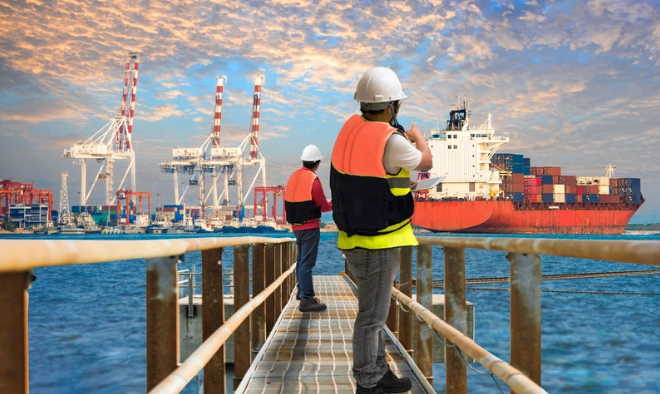
The Marine Support Industry: An Expansive Workforce Across Oceans
The marine support industry is an integral part of the global economy, spanning across numerous sectors including shipping, offshore energy, ksheries, and maritime logistics. This industry is not only vital for the movement of goods and resources but also plays a crucial role in global energy production, environmental protection, and international trade. With such a broad scope, it is no surprise that the marine support industry is a signikcant source of employment worldwide. In this article, we will delve into the various facets of the marine support industry, examining the types of jobs available, their distribution across different sectors, and the factors influencing employment levels in this vital industry.
The marine support industry encompasses a wide range of activities and services that support maritime operations. These include:
- Shipbuilding and Repair: This sector involves the construction, maintenance, and repair of ships and other marine vessels. It is a labor-intensive industry that requires a range of skilled workers, from engineers and welders to electricians and shipwrights.
- Offshore Oil and Gas: The exploration, extraction, and transportation of oil and gas from offshore kelds is a critical component of the marine support industry. Jobs in this sector range from offshore drilling rig workers and divers to marine engineers and support vessel crews.
- Marine Logistics and Transportation: This sector involves the management of the supply chain for marine operations, including the transportation of goods, personnel, and equipment to and from offshore and coastal locations. It includes roles such as logistics coordinators, port operators, and transportation planners.
- Renewable Energy: The growing demand for renewable energy has led to the expansion of offshore wind farms and other marine-based renewable energy projects. This sector creates jobs for wind turbine technicians, environmental scientists, and marine construction workers.
- Marine Equipment Manufacturing: The production of specialized equipment used in marine operations, such as navigation systems, safety gear, and underwater robotics, is another key component of the marine support industry. This sector employs engineers, product designers, and manufacturing workers.
- Environmental Services: The marine support industry also includes companies that provide environmental services, such as oil spill response, waste management, and environmental monitoring. Jobs in this sector include environmental consultants, marine biologists, and pollution control specialists.
- Consultancy and Engineering: Marine consultancy krms offer expertise in areas such as vessel design, maritime law, environmental impact assessments, and regulatory compliance. This sector employs marine surveyors, legal experts, and engineering consultants.
Employment in the Marine Support Industry: A Global Overview
The number of jobs in the marine support industry is vast, with employment opportunities distributed across the globe. However, the exact number of jobs can be challenging to quantify due to the industry’s broad scope and the varying levels of maritime activity in different regions. Nonetheless, we can gain insights by examining employment trends in key sectors and regions.
Shipbuilding and Repair
The shipbuilding and repair sector is one of the most signikcant employers within the marine support industry. Countries with robust shipbuilding industries, such as South Korea, China, Japan, and Germany, employ large numbers of workers in this sector. For instance, South Korea alone employs hundreds of thousands of people in shipyards, with companies like Hyundai Heavy Industries and Samsung Heavy Industries leading the way.
In Europe, countries like Germany, Norway, and the Netherlands are also major players in shipbuilding and repair, particularly for specialized vessels such as luxury yachts, cruise ships, and offshore support vessels. The European shipbuilding industry employs around 300,000 people, with a signikcant portion of these jobs concentrated in Germany and Italy.
In North America, the shipbuilding industry is smaller but still signikcant, with major shipyards located in the United States and Canada. The U.S. shipbuilding industry employs approximately 110,000 people, with major shipyards located in states like Virginia, Mississippi, and Maine.
Offshore Oil and Gas
The offshore oil and gas sector is another major employer within the marine support industry, particularly in regions with signikcant offshore energy reserves. The Gulf of Mexico, the North Sea, and Southeast Asia are among the most active regions for offshore oil and gas production.
In the Gulf of Mexico, the offshore oil and gas industry employs tens of thousands of workers in various roles, including rig workers, marine engineers, and support vessel crews. The North Sea, which includes the waters off the coasts of the United Kingdom and Norway, is another major hub for offshore oil and gas production. In the UK alone, the offshore oil and gas sector supports around 270,000 jobs, with a signikcant portion of these roles located in Scotland.
Southeast Asia is another key region for offshore oil and gas, with countries like Malaysia, Indonesia, and Thailand playing a signikcant role in global energy production. In Malaysia, the oil and gas sector, including offshore activities, employs over 200,000 people.
Marine Logistics and Transportation
The marine logistics and transportation sector is vital for global trade, and as such, it is a signikcant source of employment. Major ports and logistics hubs around the world employ large numbers of workers in roles such as dockworkers, crane operators, logistics coordinators, and customs of kcials.
Asia is home to some of the world’s busiest ports, including Shanghai, Singapore, and Hong Kong. These ports employ tens of thousands of workers in various capacities, supporting the smooth flow of goods in and out of the region. For example, the Port of Shanghai, the world’s busiest container port, employs over 50,000 people.
In Europe, ports like Rotterdam, Antwerp, and Hamburg are critical nodes in global trade, employing thousands of workers in marine logistics and transportation. The Port of Rotterdam alone employs around 180,000 people, either directly or indirectly.
In the United States, major ports such as Los Angeles, Long Beach, and New York-New Jersey are also signikcant employers. The Port of Los Angeles, the busiest container port in the U.S., supports over 900,000 jobs in the region, including those in marine logistics, transportation, and related industries.
Renewable Energy
The renewable energy sector, particularly offshore wind, is a rapidly growing area within the marine support industry. Countries like the United Kingdom, Germany, Denmark, and the United States are investing heavily in offshore wind farms, creating new job opportunities.
In the United Kingdom, the offshore wind industry supports around 26,000 jobs, with expectations for further growth as the country continues to expand its renewable energy capacity. Similarly, Germany’s offshore wind sector employs over 24,000 people, with major projects located in the North Sea and the Baltic Sea.
The United States is also seeing growth in the offshore wind sector, particularly along the East Coast. The development of new offshore wind farms is expected to create thousands of jobs in engineering, construction, and operations.
Marine Equipment Manufacturing
The manufacturing of marine equipment, such as navigation systems, safety gear, and underwater robotics, is another signikcant source of employment within the marine support industry. Companies involved in this sector are often located in countries with strong maritime traditions and advanced manufacturing capabilities.
In Europe, countries like Germany, France, and the United Kingdom are leaders in marine equipment manufacturing. For example, Rolls-Royce Marine, based in the UK, is a major producer of marine propulsion systems and employs thousands of people globally.
In Asia, Japan and South Korea are also signikcant players in the marine equipment manufacturing sector. These countries produce a wide range of products, from ship engines to advanced navigation systems, supporting thousands of jobs in the process.
Environmental Services
The growing emphasis on environmental protection and sustainability has led to the expansion of the environmental services sector within the marine support industry. This sector includes companies that provide oil spill response, waste management, and environmental monitoring services.
In the United States, the environmental services sector supports around 3.4 million jobs, with a portion of these roles dedicated to marine and coastal activities. This includes jobs in oil spill response, marine pollution control, and environmental consulting.
In Europe, countries like Norway and the Netherlands are leaders in marine environmental services, with companies specializing in oil spill response, environmental impact assessments, and sustainable marine practices. These companies employ thousands of people across the continent.
Consultancy and Engineering
The consultancy and engineering sector within the marine support industry provides specialized expertise in areas such as vessel design, maritime law, and environmental impact assessments. This sector employs professionals such as marine surveyors, legal experts, and engineering consultants.
In the United Kingdom, the consultancy and engineering sector is a signikcant source of employment within the marine support industry. Companies like Lloyd’s Register and DNV GL provide a range of services, from ship classikcation to environmental consulting, employing thousands of people in the process.
In the United States, the consultancy and engineering sector is also a key employer, particularly in coastal regions with a strong maritime presence. Firms specializing in marine engineering, environmental assessments, and regulatory compliance support thousands of jobs nationwide.






